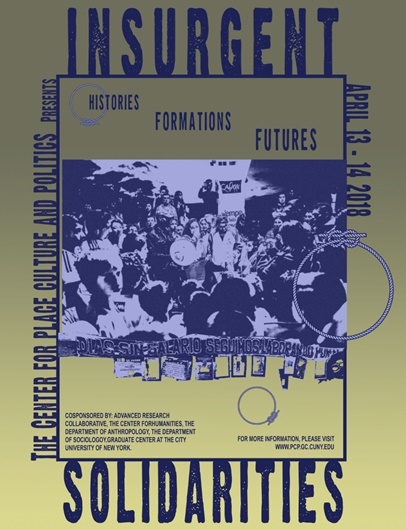
Shemon Salam
Every tradition of the Left carries with it the moral and strategic imperative of solidarity: an injury to one is an injury to all, an injustice anywhere is a threat to justice everywhere, and that workers have no country to call their own. The Insurgent Solidarities Conference, sponsored by the Center for Place Culture and Politics at the CUNY Graduate Center, invoked this long history. The importance of solidarity has become central in light of the ecological and economic crises currently unfolding across the planet. Many of these challenges seem impossible to surmount, but perhaps we can begin in daily solidarities.
Surveying Puerto Rico, Honduras, and Brooklyn, the “Economies and Solidarities” panel brought together Giovanni Roberto, Yasmin Lopez, and Mark Winston Griffith to discuss the importance of building solidarity through economic development and cooperation. Lopez began the conversation describing Honduran women farm workers’ struggles against the centrality of machismo and imperialism, as they develop their communities. The stakes of these struggles were made clear when Lopez asked, “if we are not going to defend life, who will do it for us?” For Lopez and her organization this meant fighting for rights such as access to education and the rights of women farm workers.
Life and death as the stakes of organizing were just as apparent in Giovanni Roberto’s discussion of Puerto Rico. He highlighted the resilience of everyday Puerto Ricans, who created community kitchen programs in the wake of Hurricane Maria. These kitchens are not liberal models of charity but, rather, spaces of exchange that foster cooperation, trust, and community development. In exchange for a plate of food, community members donate time or a small item, which Roberto asserted creates a relationship of cooperation instead of dependency. At the same time, he warned that Puerto Rico has been devastated and needs more than just solidarity if its people are going to survive.
Mark Winston Griffith described his work in building food co-operatives as a fight against “racial and economic cleansing” caused by gentrification. Food co-ops bring affordable and quality food to under-served neighborhoods and create strong communities able to resist gentrification. He emphasized that at the same time, those in solidarity must recognize that organizations developed in Bedford-Stuyvesant and Crown Heights must be Black-led.
In the discussion following these presentations, the moderator Abby Scher asked how to make these local solidarities global. Lopez believed the place to begin was from a local and feminist standpoint. Roberto felt the Young Lords and the Black Panther Party were excellent examples to follow but also pointed out that power resides in the United States’ colonial relationship with Puerto Rico. Mark Griffith emphasized the importance of local connections. His concern was that food co-ops in Brooklyn do not communicate with each other. How can we communicate globally, if we are not doing that locally?
Overall the panelists grappled with the different scales of solidarity, crisis, and solution. The attempt to connect the local to the global remains a difficult process, having to cross borders, race, and gender. However the panelists showed that solidarity was not possible without starting from where your feet are planted.